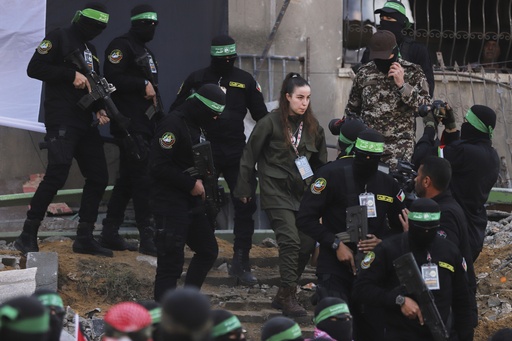In a recent interview, an Israeli woman released from Hamas captivity during the current ceasefire shared her experience and how her faith helped her endure the ordeal. Agam Berger spoke to Israeli public radio, revealing that she was moved around multiple times during her nearly 16-month imprisonment in the Gaza Strip. Throughout her captivity, she was held in various locations, including tunnels and apartments, alongside other female detainees. The conditions fluctuated based on the location and the guards overseeing them.
“We had food and conditions that were relatively okay, considering what could have been,” Berger stated. “But really, these are not conditions for a human being.” Berger, a military spotter, was captured with other female soldiers from a base in southern Israel on October 7, 2023. She was freed last month amid a ceasefire in the 15-month conflict.
While other freed captives have described harsh conditions, including starvation and abuse, Berger noted that circumstances worsened after previous military rescues heightened the anxiety of her captors. Hamas has released 25 living hostages and returned the remains of four others as part of a ceasefire agreement. On Tuesday, a funeral was held for Oded Lifshitz, an 83-year-old who was one of the oldest captives taken in Hamas’ attack, which ignited the Gaza conflict. Israel reports that he was killed during captivity.
Despite her imprisonment, Berger’s family reported that she continued to observe her faith. In January 2024, her captors provided two Jewish prayer books and other objects left by Israeli soldiers. Berger spent her first Hannukah in custody in December 2023, inside a tunnel with four other captives. They requested candles from their captors to mark the holiday when candles are lit on a menorah for eight nights, and they received one candle.
She tracked the date using a clock until it was taken away months before her release, which made it difficult to keep up with Jewish holidays unless she saw Israeli news. Throughout her time in captivity, the 20-year-old Berger was typically fed two meals a day consisting of pita and rice. Limited access to news allowed her to learn about the ongoing war, including domestic debates in Israel regarding the terms of hostage release. She expressed feeling demoralized when she discovered reluctance to make significant concessions for their release. “It’s like saying that our lives aren’t worth enough,” she remarked.
Israel is exchanging hundreds of Palestinian prisoners for the release of hostages. Berger learned the night before her release that she would be freed, leading to a sleepless night. The next morning, Palestinian women prepared her in dark green military fatigues she would wear at a staged release ceremony. She was coerced into writing a thank-you note to her captors.
“I just tried to invent things and thought, ‘I don’t care. I’m going home today,'” she explained. Berger was not allowed to take any possessions she had accumulated during her time in confinement, including notebooks filled with sketches, birthday cards for relatives, and the prayer book.


